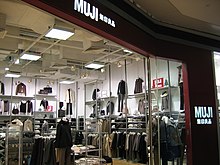| Demographics and culture of Hong Kong |
|---|
| Demographics |
| Culture |
| Other Hong Kong topics |



Shopping is a popular social activity in Hong Kong,[1][2] where basic items for sale do not draw any duties, sales taxation, or import taxation.[3] Only specific import goods such as alcohol, tobacco, perfumes, cosmetics, cars and petroleum products have associated taxes. For companies, there is a 17.5% corporate tax, which is lower than international standards.[1] Shoppers reportedly spend over US$5.2 billion a month in Hong Kong shops.[4]
Hong Kong's proximity to manufacturing plants in China, as well as its status as a free port, allow it to sell and transport a wide variety of goods. There are few restrictions on merchandise vending, and therefore items such as realistic toy weapons are available. The two main shopping seasons are at Christmas and the Chinese New Year.
The region is unique in the sense that it is official languages are both Cantonese and English, which enables a healthy tourist trade with English-speaking customers as bilingual sales tags and salespeople are common, especially in tourist areas. The MTR subway and effective taxi service also facilitate Hong Kong's busy shopping industry.
- ^ a b Fallon, Stephen (2006). Hong Kong & Macau. Lonely Planet city guide (12th ed.). Footscray, Vic: Lonely Planet. ISBN 978-1-74059-843-9. OCLC 62225842.
- ^ Mathews, Gordon; Lui, Tai-Lok (2001). Consuming Hong Kong. Hong Kong culture and society. Hong Kong: Hong Kong University Press. ISBN 962-209-546-1. OCLC 47638448.
- ^ Barber, Nicola (2004). Hong Kong. Great cities of the world. Milwaukee, WI: World Almanac Library. ISBN 0-8368-5038-6. OCLC 54544041.
- ^ Cheung, Tony. "Consumer Products and Retail | English". www.investhk.gov.hk. Archived from the original on 10 June 2016. Retrieved 7 June 2016.
